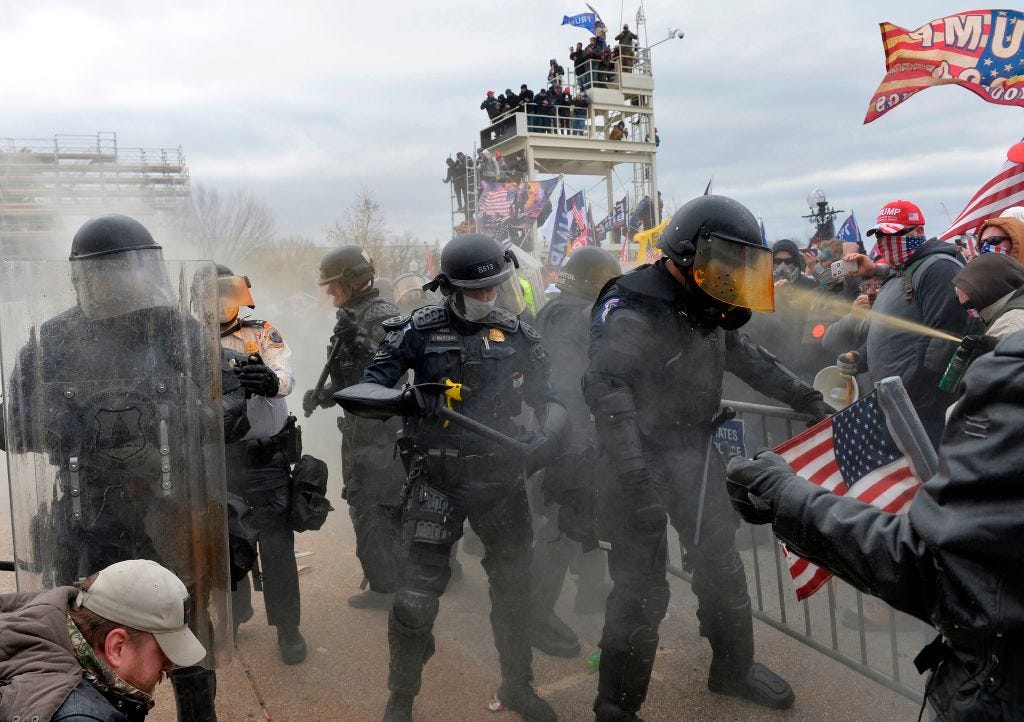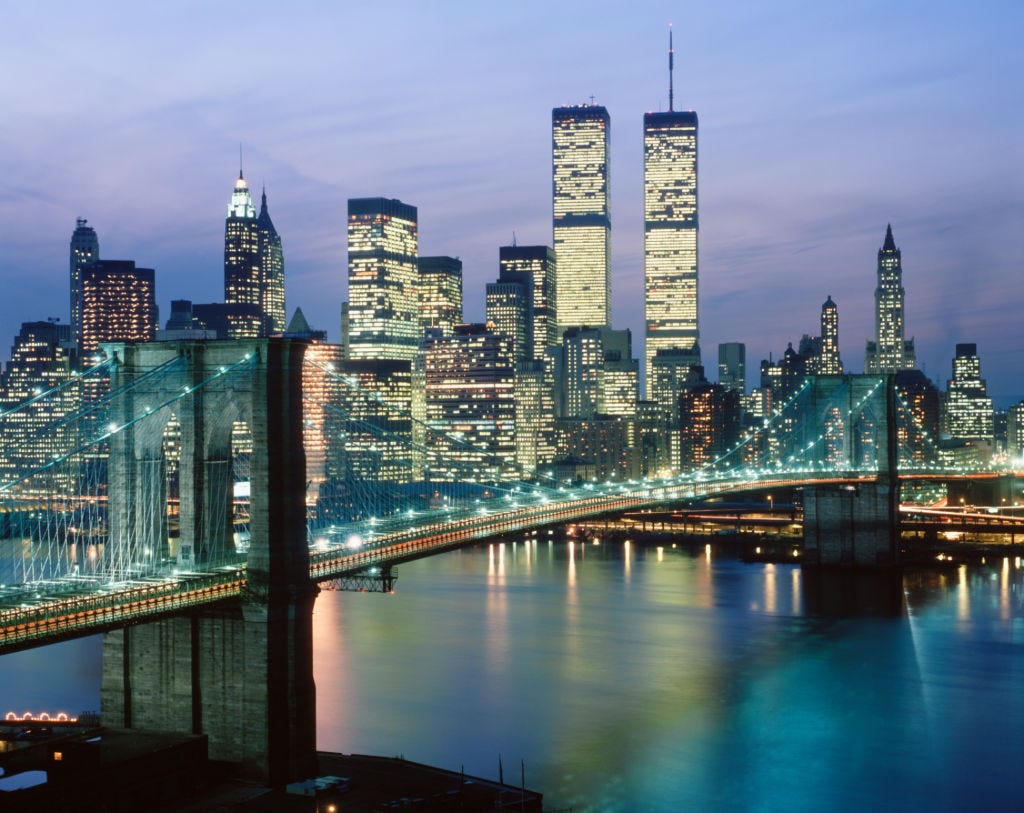Remembering September 11th In The Shadow Of January 6th

This is a special issue of The Uprising, a newsletter dedicated to independent, original political journalism.
I will never forget the smoke.
The September 11th attacks occurred the day after I turned 17 years old. My high school, Brooklyn College Academy, was about seven miles from ground zero and four from my house. After the towers came down, I managed to catch a bus out of Flatbush before they all shut off. It only took me as far as Coney Island Avenue. When I turned that corner, there was brown smoke and bits of paper wafting through the air. I was still six miles out in Brooklyn. My knees shook.
Seeing smoke so far from the site of the attack brought home just how bad things were. I don’t remember how it smelled as I walked through the haze, but I can still perfectly picture that corner with the day’s infamously bright blue sky turned sepia. Some memories don’t fade, they are seared into your subconscious. The mind makes permanent snapshots of terror.
My mother sometimes worked in one of the towers. I initially began a mad dash home across Brooklyn because I worried she was there and wanted to get my little sister. That fear didn’t last. I somehow managed to get a call through and discovered my mom had been in Midtown that day and was on her way home too.
Once I got to my house, I turned on the TV and saw dusty footage of stretchers being wheeled in and out of Stuyvesant, a high school that I had attended for two-and-a-half years. I thought my friends there were dead until I got someone on the phone. They had all been evacuated and the school was being used as a morgue. The friend I spoke to told me how they saw bodies hitting the ground.
The pain of that day persisted in New York. We felt it each time we looked up at the scarred skyline. For years, I saw shadows of the Twin Towers, an architectural phantom limb.
The World Trade Center wasn’t just buildings. It was ours. Those towers were where I went on a first date and experienced a treasured afternoon with my grandmother. They were in the background for almost every day of my life. Those skyscrapers were the very embodiment of New York City swagger. Seeing them anchor the city and glitter at night left no doubt that there’s no bigger or better place in the world.
Every New Yorker who was in the city that day has an acute awareness that some people had it far worse than others. The less tragic experiences seem almost not worth sharing. Being from the city also generally means being reluctant to talk about that day at all. Nearly 3,000 people died and tens of thousands were injured.
Many people — including friends of mine — have spent the two decades afterwards dealing with health problems and a system that cared for them terribly. Some of them died too. Nothing in our country’s modern history compares to 9/11. The years of war and terror that followed have only deepened the wound.
These things have kept me from discussing my own experiences from that day. However, this year I feel compelled to share because there were things I saw on January 6th that burned into my mind the same way.
Of course, the single digit death toll from January 6th is nothing compared to September 11th. The level of human loss is not even close. However, as members of law enforcement who spent hours in a “medieval battle” with the crowds that mobbed the Capitol have outlined in painful detail, there were essentially a series of small miracles that prevented more bloodshed on January 6th.
God knows what could have happened if Capitol Police officer Eugene Goodman hadn’t singlehandedly managed to steer the surging crowd away from the Senate chambers. The democratic process that mob hoped to disrupt was saved thanks to a quick thinking staffer. And while both the officers and many of the rioters had guns, mass shooting didn’t break out. In large part, that’s because those officers knew it would be incredibly violent if they opened fire.
“During the assault, I thought about using my firearm on my attackers,” D.C. Police officer Mike Fanone said in a July congressional hearing. “But I knew that, if I did, I would be quickly overwhelmed and that, in their minds, would provide them with the justification for killing me.”
That calculus played itself out hundreds of times along the front lines as the January 6th first responders held back the crowd. The restraint shown by those officers as they were beaten, clubbed, and clawed at on the steps of the U.S. Capitol saved many lives.
One of the reasons we honor September 11th is the stunning heroism of the policemen, firefighters, and others who ran back into the towers as they burned. The law enforcement who protected the Capitol on January 6th displayed similar courage. They ran towards a violent scene at great personal peril. Over 100 were injured.
Yet we have not honored the sacrifice of these first responders on January 6th as we did the heroes of September 11th. Instead, we are allowing their heroism to be questioned. They have had to testify before Congress because there are people in this country who actually suggest that the attack on January 6th didn’t happen at all, or worse, that the perpetrators of that illegal, authoritarian assault on the very seat of our democracy were the real heroes.

September 11th and January 6th are the worst acts of political violence in our country in the past two decades. Their impacts were far different, but they belong in a unique category given that the targets were iconic symbols of the American idea.
Nevertheless, January 6th has provoked little of the commemoration we normally afford to terror attacks and tragedies. What color ribbon did anyone wear? Was there a #DCStrong hashtag? No. Instead, there are some — including elected officials — openly suggesting nothing happened that day and advocating for the rioters who broke into the Capitol. And despite all the fears and concerns about “cancel culture,” the people making objectively outrageous comments about January 6th have largely done so without consequence.
National attention has largely moved on as these deniers and defenders encourage collective amnesty. A violent crime directed at the core ideals of this country unfolded before our eyes. There are those who want you to believe it didn’t happen at all or that this is just another political issue that’s up for argument. It’s not. January 6th was a violent attack on America.
In the aftermath of September 11th, the country came together. This surge of patriotism and unity — for whatever else it did — served as a balm to survivors. Col. Philip McNair, who survived the Pentagon attacks and ran back in to help others, described this in an interview that aired on NPR for the anniversary where he talked about returning to work in the aftermath and said: “The thing that buoyed our spirits a bit was the patriotism this whole thing inspired.” We’ve given little of this comfort to the survivors of January 6th despite their great pain.
January 6 might not merit the same memorialization as September 11th, but it deserves more than we’ve given it. One is properly regarded as an attack on the nation and our core values while the other is being swept under the rug by some leaders of this country.
The truth that has made January 6th inconvenient is that a sizable number of our fellow Americans supported it. This doesn’t make it acceptable.
Denying the horror of January 6th runs the risk of letting the darkest forces that fueled it continue to metastasize. Former President George W. Bush underscored the dangers of ignoring domestic extremism in his speech marking the 20th anniversary of September 11th where he partly alluded to January 6th as “growing evidence that the dangers to our country can come not only across borders, but from violence that gathers within.”

Trauma does funny things to the brain. It makes some memories unreliable and others crystal clear. The sight of that smoke on September 11th and certain scenes I saw on January 6th are some of the only things in my life that I remember with that persistent precision.
If I close my eyes, I can also still picture a particular moment when I watched people climbing through the broken windows of the Capitol. That was when I realized no one was in control and shooting could break out at any second. It was when it was clear that one of the county’s most sacred symbols had been violated. I also remember a vivid glimpse of the gallows that was erected at the Capitol steps. While it's burned into my brain, I didn’t get pictures of the noose. Even though I had been walking through the mob for hours, I had a sudden and strong instinct that, if I turned my camera towards the rope or walked closer, I would get hurt.
I’ve talked to therapists and other people who have experience working with trauma. Those uniquely sharp memories occur after we see something shockingly abnormal or dangerous. They are our bodies’ way of marking something that’s worth remembering and processing.
My brain cells are telling me that both January 6th and September 11th are unique traumas that must be dealt with. These two dark days are linked forever in my head as the visceral, tragic episodes of 21st century America.
Wounds that go untreated never properly heal. Attacks on our country should cause us to stop in our tracks. We must commemorate the insurmountable losses and deep impact of September 11. We should also remember and reckon with January 6 — no matter how much some want us to forget.
More Stories From The Uprising:
Going Down The ‘Big Lie’ Rabbit Hole With Former President Trump
Police Records Refute GOP’s ‘No Firearms’ Claim About January 6 Riot
PHOTO: Trump Met Man Who Helped Organize ‘Patriot Caravans’ On January 6
Andrew Yang Presidential Advisers Blame Tusk Strategies For ‘Crashing’ His Mayoral Bid
President Biden’s ‘Very Strange Decision’ That Could Send Thousands Back In Prison




Excellent column.....
Thank you for this, Hunter. As I've looked at various remembrances online and on-air, I can't help but think of the fear that had to have run through the hearts of everyone in and around the attacks. While I understand the desire of the country to reflect and commemorate, I'm also concerned about how difficult it must be for so many to have to relive those feelings. With that, I hope that you and yours are well, and thank you for the work that you're doing.